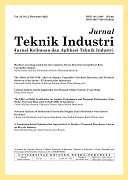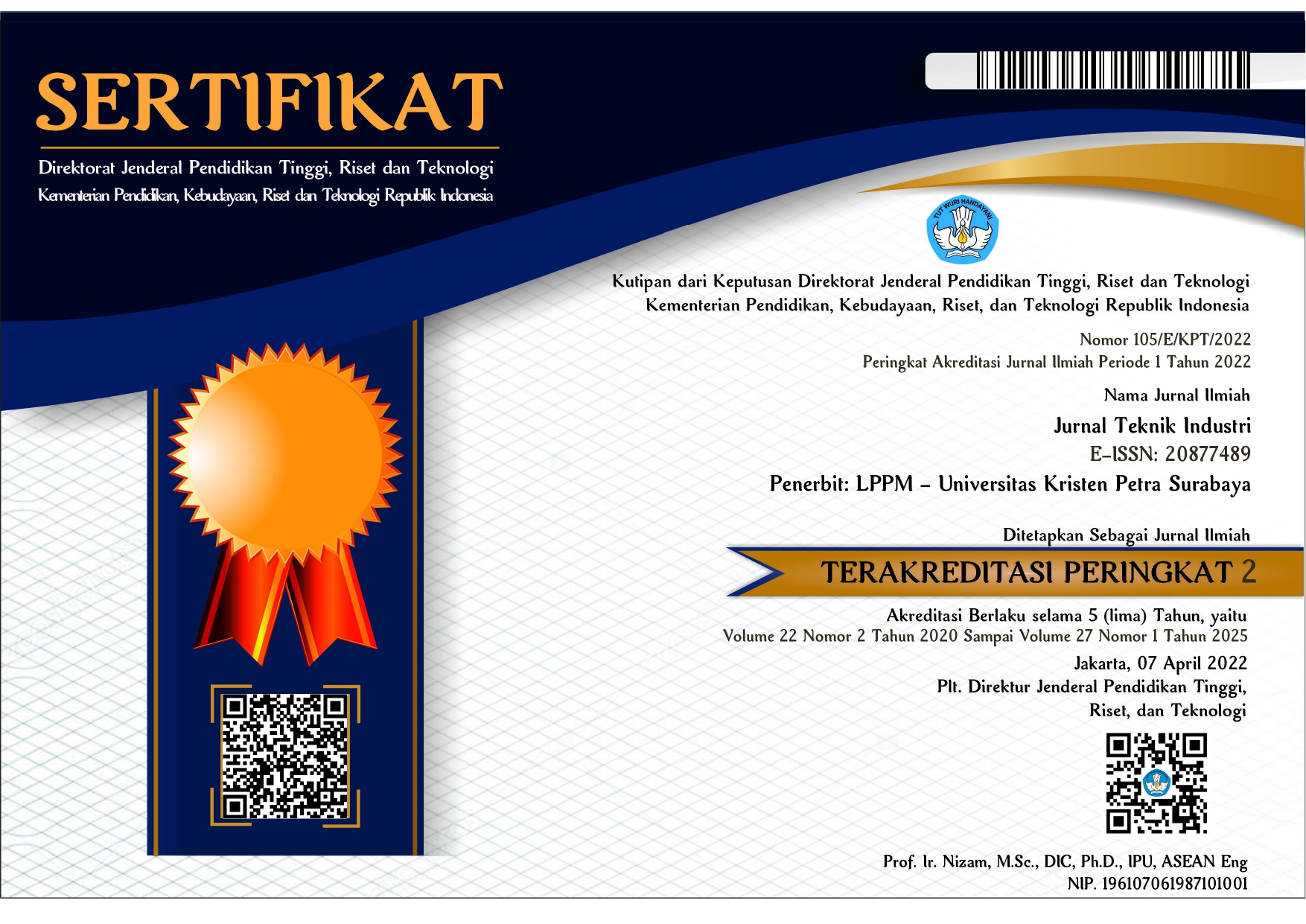The Effect of Halal Certification on Logistic Performance and Financial Performance
Case Study: Processed Meat and Cowhide SMEs in Surakarta
DOI:
https://doi.org/10.9744/jti.24.2.117-128Keywords:
Halal certification, logistic performance, financial performance , PLS-SEMAbstract
Amid increasingly fierce competition in the food business, halal certification is a source of excellence. Halal certification is now a step businesses can take to increase their successful business performance. This study aims to provide business actors with a deeper understanding of the impact of halal certification on company performance by analyzing the effect of halal certification on logistic performance and financial performance in small and medium-sized enterprises (SMEs) based on processed meat and cowhide in Surakarta. This study is based on a purposive sampling survey of SMEs producing processed meat and cowhide in Surakarta that has obtained halal certification. The PLS-SEM method was used to process the data. This research shows that halal certification has a good and significant impact on the logistical and financial performance of SMEs producing processed meat and cowhide in Surakarta. This founding indicates that halal certification has an impact and may be considered by business actors who have yet to go through the process.
Downloads
References
Kemendagri, Visualisasi Data Kependudukan, 2021, retrieved from
https://gis.dukcapil.kemendagri.go.id/peta/.
Indonesia, Undang-undang Nomor 33 Tahun 2014 tentang Jaminan Produk Halal, Lembaran Negara RI Tahun 2014 Nomor 295, Tambahan Lembaran RI Nomor 5604, Sekretariat Negara, Jakarta, 2014.
LPPOM-MUI, Panduan Umum Sistem Jaminan Halal LPPOM-MUI, LPPOM-MUI, Jakarta, 2008.
LPPOM-MUI, Sertifikat/Ketetapan Halal MUI, LPPOM-MUI, Jakarta, 2018.
Zainuddin, N., Saifudin, A. M., Erenbjerg, P., and Mahidin, N., Effect of Halal Certification and Labelling Process on Halal Supply Chain Performance, International Journal of Supply Chain Management, 8(4), 2019, pp. 1075-1081.
Qurtubi, Pengaruh Kinerja Logistik terhadap Kinerja Perusahaan dengan Variabel Eksogen Efisiensi Logistik, Efektivitas Logistik, Diferensiasi Logistik dan Sertifikasi Halal, Disertasi, Jurusan Ilmu Ekonomi, Universitas Islam Indonesia, Yogyakarta, 2021.
Green, K. W., Whitten, D., and Inman, R. A., The Impact of Logistic Performance on Organizational Performance in A Supply Chain Context, Supply Chain Management, 13(4), 2008, pp. 317–327.
Ab Talib, M. S., Abdul Hamid, A. B., and Chin, T. A., Can Halal Certification Influence Logistic Performance?, Journal of Islamic Marketing, 7(4), 2016, pp. 461–475.
Indonesia, Undang-Undang Nomor 11 Tahun 2020 tentang Cipta Kerja, Lembaran Negara RI Tahun 2014 Nomor 245, Tambahan Lembaran RI Nomor 6573, Sekretariat Negara, Jakarta, 2020.
Mohamed Yunos, R., Mahmood, C. F. C., and Abdul Mansor, N. H., Compliance to Halal Certification - Its Impact on Business Financial Performance, Proceedings of the 2nd International Congress on Interdisciplinary Behavior and Social Sciences, 2014, pp. 499–503.
Dewi, N. W., and Candradewi, M. R., Pengaruh Employee Stock Ownership Plan, Leverage, dan Ukuran Perusahaan terhadap Kinerja Keuangan Perusahaan, E-Jurnal Manajemen Unud, 7(9), 2018, pp. 4774-4802.
Agarwal, S., Erramillli, K., and Dev. Chekitan, S., Market Oriented and Performance in Service Firm: Role of Innovation. Journal of Service Marketing, 17(1), 2003, pp. 68-82.
Sonbait, L. Y., Kesukaan Konsumen terhadap Produk Olahan Daging Sapi di Kota Manokwari, Agrinimal, 1(2), 2011, pp. 71-75.
Saragih, B., Agribisnis Berbasis Peternakan, Pustaka Wirausaha Muda, Bandung, 2000.
Badan Pusat Statistik, Rata-rata Konsumsi Perkapita Seminggu Menurut Kelompok Daging Per Kabupaten/kota (Satuan Komoditas) 2021, 2021 retrieved from
BPS Kota Surakarta, Kota Surakarta dalam Angka 2022, 2022 retrieved from
Murty, K. A., and Kusnandar, S., Strategi Pengembangan Industri Kecil Rambak Kulit Sapi di Kota Surakarta, AGRISTA, 5(3), 2017, pp. 354–363.
Dinas Kebudayaan dan Pariwisata Kota Surakarta, Kunjungan Wisatawan Kota Surakarta Tahun 2020–2021, Dinas Kebudayaan dan Pariwisata Kota Surakarta, Surakarta, 2021.
Mardiah, Amalia, L., and Trimelati, D. A., Analisis Kehalalan Daging Sapi dengan Metode Pork Detection Kit (PDK) dan Tingkat Kepedulian Konsumen dalam Mengkonsumsi Daging Sapi Halal, Jurnal ilmiah Pangan Halal, 2(2), 2020.
Sayuti, M., Purnamasari, A., and Indah Pratiwi, A., Penerapan Halal Logistik pada Distribusi Daging Sapi di Kabupaten Karawang. Jurnal Integrasi Sistem Industri, 8(1), 2021.
Akmad Salindal, N., Ismail Ahmad, M., Abdullah, K., and Paguimanan Ahmad, B., A Structural Equation Model of the Halal Certification and its Business Performance Impact on Food Companies, International Journal of Economics, 26(1), 2018.
Puspitasari, D. A., and Urumsah, A., Influence Of Halal Certification On Innovation and Financial Performance, Jurnal Reviu Akuntansi Dan Keuangan, 11(3), 2021, pp. 650–666.
Muslimin, Hadi, S., and Ardiansyah, The Relationship between Logistic and Financial Performance of SMEs in Indonesia, IJABER, 13(7), 2015, pp. 4805-4814.
Nordin, D., Husain, R., Yulia, A., Abu Basar, S., and Fuad Salleh, M., The Effect of Halal Certification on Financial Performance of Halal Food Companies in Malaysia, Proceedings of UNISEL Bestari Research Projects, 2016, pp. 121-127.
Neely, A., Gregory, M., and Platts, K., Performance Measurement System Design: A Literature Review and Research Agenda. International Journal of Operations and Production Management, 15(4), 1995, pp. 80–116.
Schramm-Klein, H., and Morschett, D., The Relationship Between Marketing Performance, Logistic Performance and Company Performance for Retail Companies. International Review of Retail, Distribution and Consumer Research, 16(2), 2006, pp. 277–296.
Töyli, J., Häkkinen, L., Ojala, L., and Naula, T., Logistic and Financial Performance: An Analysis of 424 Finnish Small and Medium-Sized Enterprises. International Journal of Physical Distribution and Logistic Management, 38(1), 2008, pp. 57–80.
Beamon, B. M., Measuring Supply Chain Performance. International Journal of Operations and Production Management, 19(3), 1999, pp. 275–292.
Closs, D. J., Swink, M., and Nair, A., The Role of Information Connectivity in Making Flexible Logistic Programs Successful. International Journal of Physical Distribution and Logistic Management, 35(4), 2005, pp. 258–277.
Wisner, J. D., A Structural Equation Model of Supply Chain Management Strategies and Firm Performance, Journal of Business Logistic, 24(1), 2003, pp. 1–26.
Shoukat Malik, M., and Nadeem, M., Impact of Corporate Social Responsibility on the Financial Performance of Banks in Pakistan. International Letters of Social and Humanistic Sciences, 21, 2014, pp. 9–19.
Sharma, D. S., The Association Between ISO 9000 Certification and Financial Performance. International Journal of Accounting, 40(2), 2005, pp. 151–172.
Corbett, C. J., Montes-Sancho, M. J., and Kirsch, D. A., The Financial Impact of ISO 9000 Certification in the United States: An Empirical Analysis. Management Science, 51(7), 2005, pp. 1046–1059.
Ab Talib, M. S., Ai Chin, T., and Fischer, J., Linking Halal Food Certification and Business Performance, British Food Journal, 119(7), 2017, pp. 1606–1618.
Miranda-de la Lama, G. C., Villarroel, M., Liste, G., Escós, J. and María, G. A., Critical Points in the Pre-Slaughter Logistic Chain of Lambs in Spain that May Compromise the Animal’s Welfare, Small Ruminant Research, 90(1-3), 2010, pp. 174–178.
Perdana, F. F. P., Jan, M. T., Altunişik, R., Jaswir, I., and Kartika, B., A Research Framework of the Halal Certification Role in Purchase Intention of Muslim Consumers on the Food Products from Muslim Majority Countries in The Middle East and North Africa, International Journal, 1(2), 2018, pp. 15-28.
Gulf Marketing Review, Nestle Halal Ranges to Go Mass Market, 2009.
Sentia, P. D., Ramadani, R., and Zuhri, S., Logistic Performance Determination on the Arrival of Ship Container, Jurnal Teknik Industri, 20(1), 2018, pp. 59-64.
Mansidao, R., and Coelho, L. A. G., Logistic Performance: a Theoretical Conceptual Model for Small and Medium Enterprises, CEFAGE-UE Working Paper, 2014. pp. 1-4.
Giyanti, I., Indrasari, A., Sutopo, W., and Liquiddanu, E., Halal Standard Implementation in Food Manufacturing SMEs: its Drivers and Impact on Performance, Journal of Islamic Marketing, 12(8), 2021, pp. 1577–1602.
Salindal, N. A., Halal Certification Compliance and its Effects on Companies’ Innovative and Market Performance, Journal of Islamic Marketing, 10(2), 2019, pp. 589–605.
Revilla, M. A., Saris, W. E., and Krosnick, J. A., Choosing the Number of Categories in Agree–Disagree Scales, Sociological Methods and Research, 43(1), 2014, pp. 73-97.
Turner, D. P., Sampling Methods in Research Design, Headache, 60(1), 2020, pp. 8–12.
Simamora, L., Membentuk Motivasi Mahasiswa Menjadi Agropreneur Melalui Mata Kuliah Agrotechnopreneurship, Jurnal Manajemen, 7(1), 2021, pp. 45-55.
Sahir, S. H., Fahlevi, M., Kasbuntoro, and Sutia, S., Effect of Halal Food Management System Certification on Buying Interest of Indonesian Consumer Goods, Uncertain Supply Chain Management, 9(3), 2021, pp. 731–738.
Astuti, C. C., PLS-SEM Analysis to Know Factors Affecting The Interest of Buying Halal Food in Muslim Students, Jurnal Varian, 4(2), 2021, pp. 141–152.
Indriyastuti, H., Pengaruh Kinerja Logistik terhadap Kinerja Keuangan (Studi Empiris pada UKM di Daerah Istimewa Yogyakarta). Tugas Akhir, Jurusan Manajemen, Universitas Islam Indonesia, Yogyakarta, 2019.
Holter, A. R., Grant, D. B., Ritchie, J. and Shaw, N., A Framework for Purchasing Transport Services in Small and Medium Size Enterprises. International Journal of Physical Distribution and Logistic Management, 38(1), 2008, pp. 21-38.
Armiani, S., Basuki, B., Nurrahmadani, S., Halal Menjadi Strategi Pemasaran Bagi Umkm Nonmuslim, S., Halal Menjadi Strategi Pemasaran Bagi Umkm Nonmuslim dalam Meningkatkan Penjualan, Prosiding Seminar Stiami, 8(1), 2021, pp. 22-27.
Khairunnisa, H., Lubis, D., and Hasanah, Q., Kenaikan Omzet UMKM Makanan dan Minuman di Kota Bogor Pasca Sertifikasi Halal, AL-MUZARA’AH, 8(2), 2020, pp. 109–127.
Downloads
Published
How to Cite
Issue
Section
License
Articles published in the Jurnal Teknik Industri: Jurnal Keilmuan dan Aplikasi Teknik Industri will be Open-Access articles distributed under the terms and conditions of the Creative Commons Attribution License (CC BY).
![]()
This work is licensed under a Creative Commons Attribution License (CC BY).



















